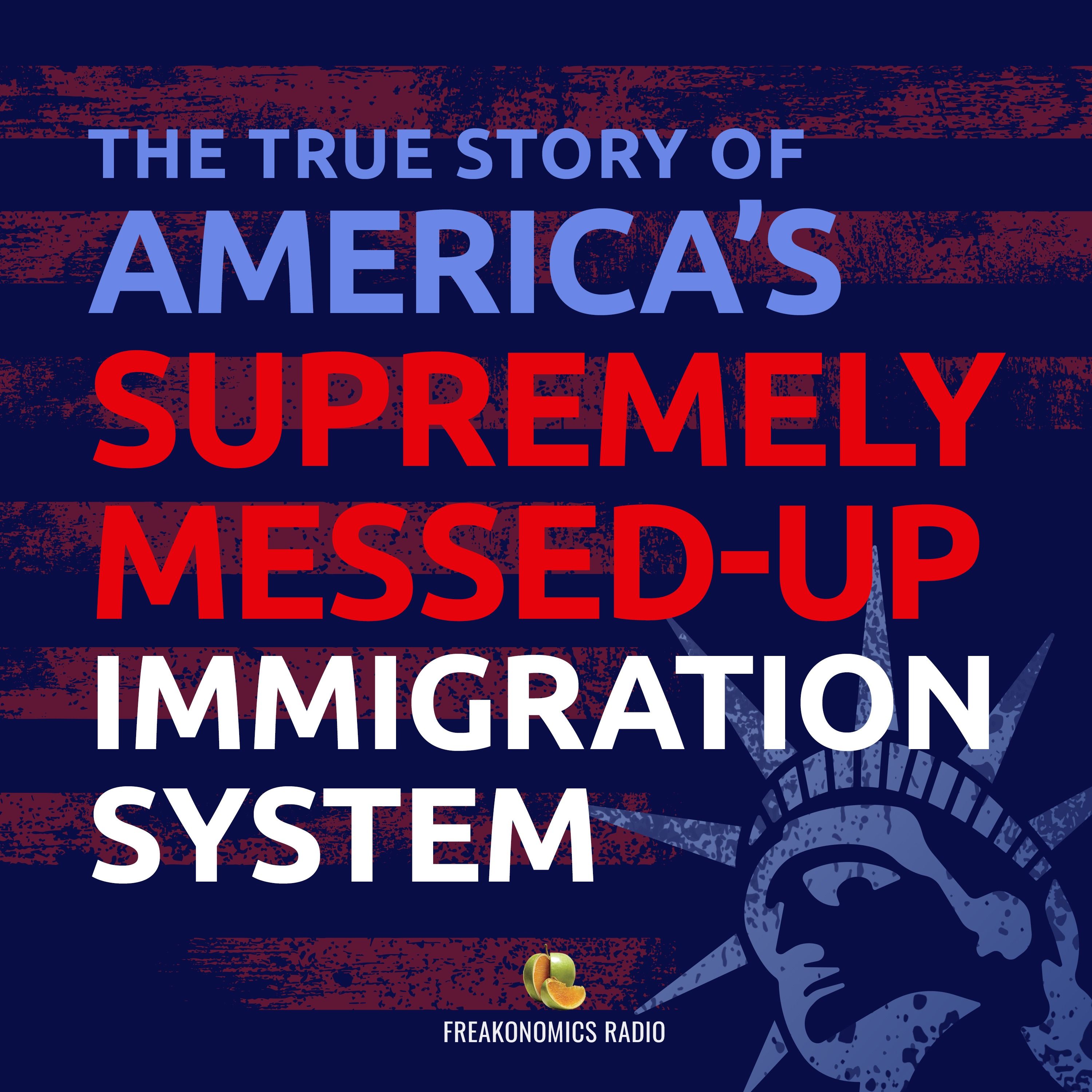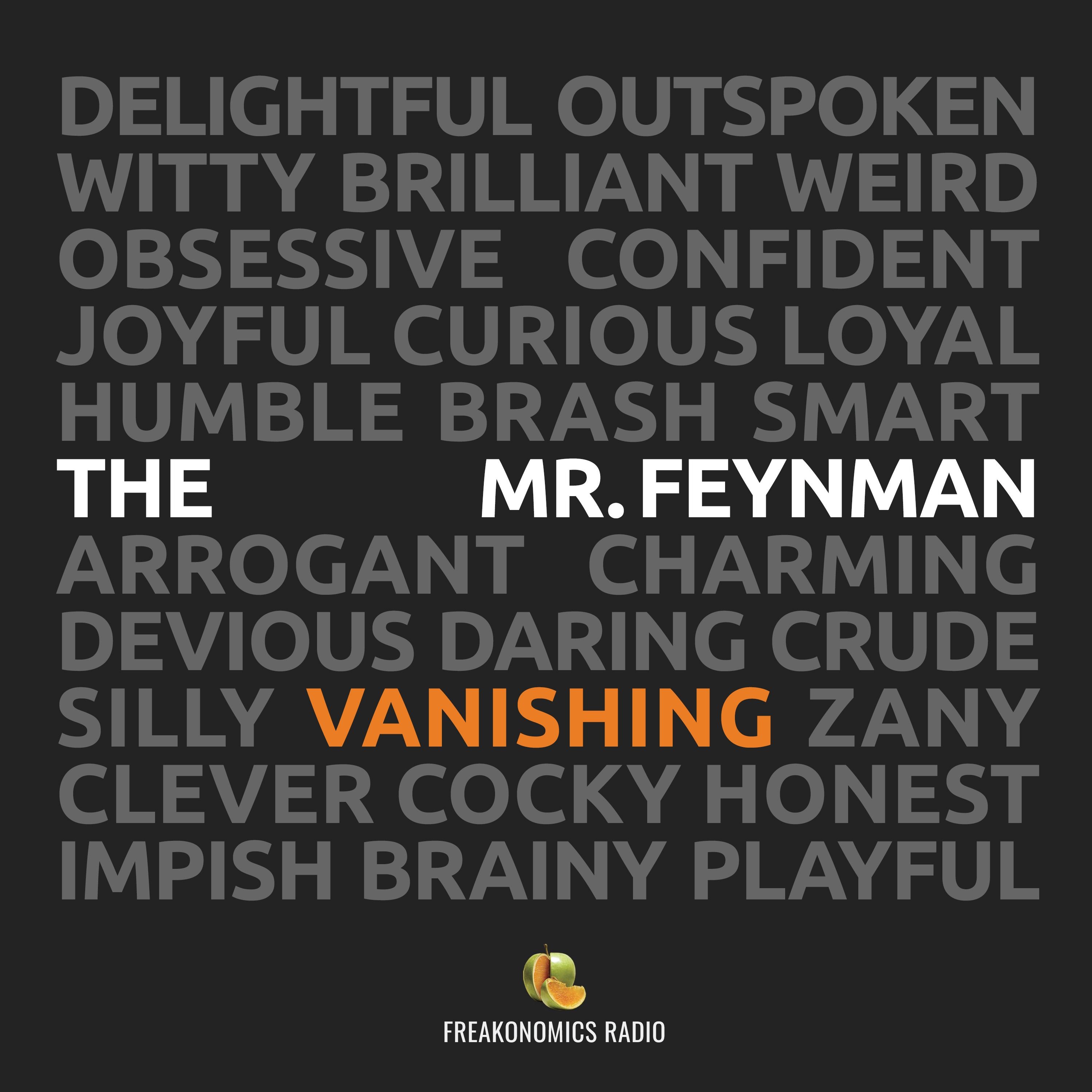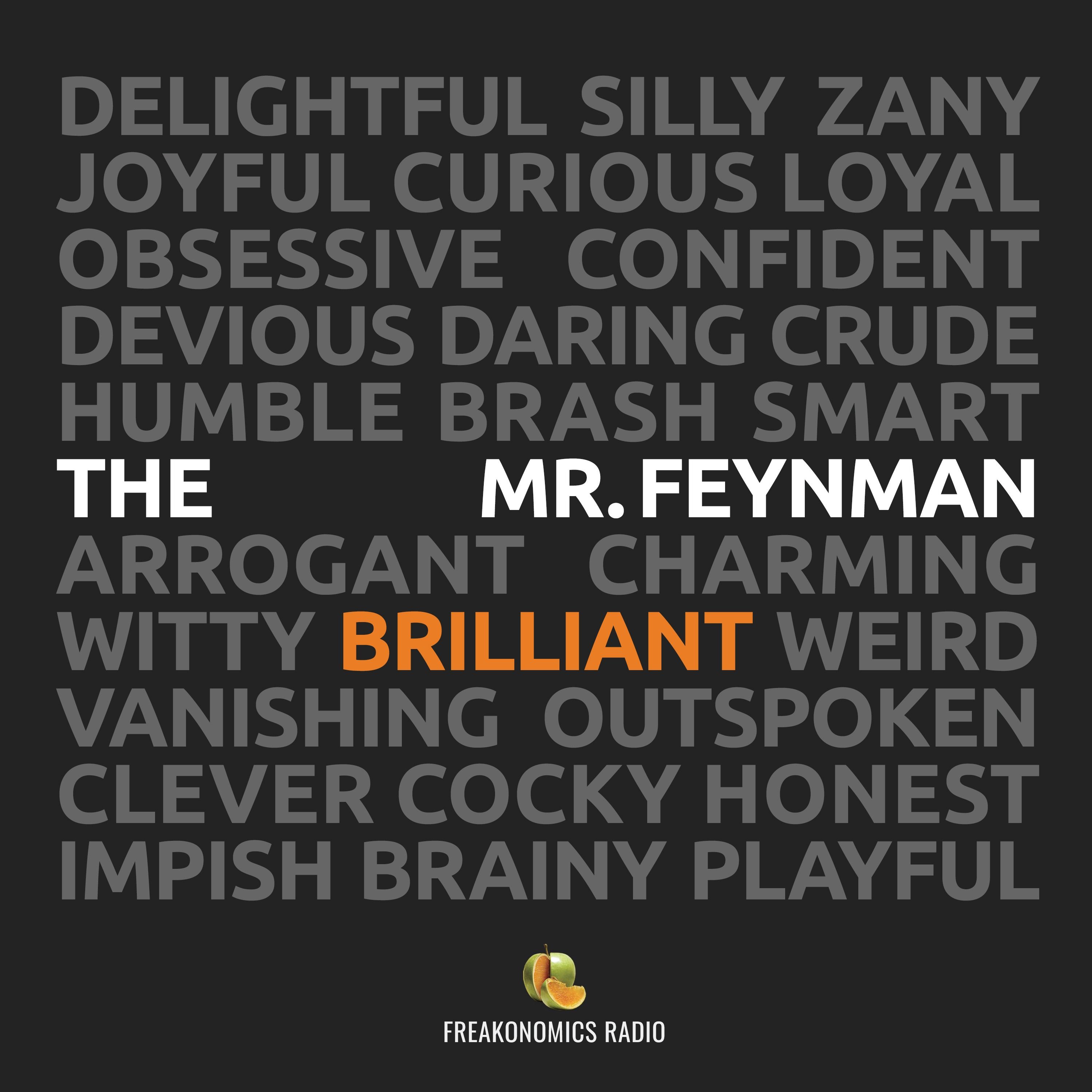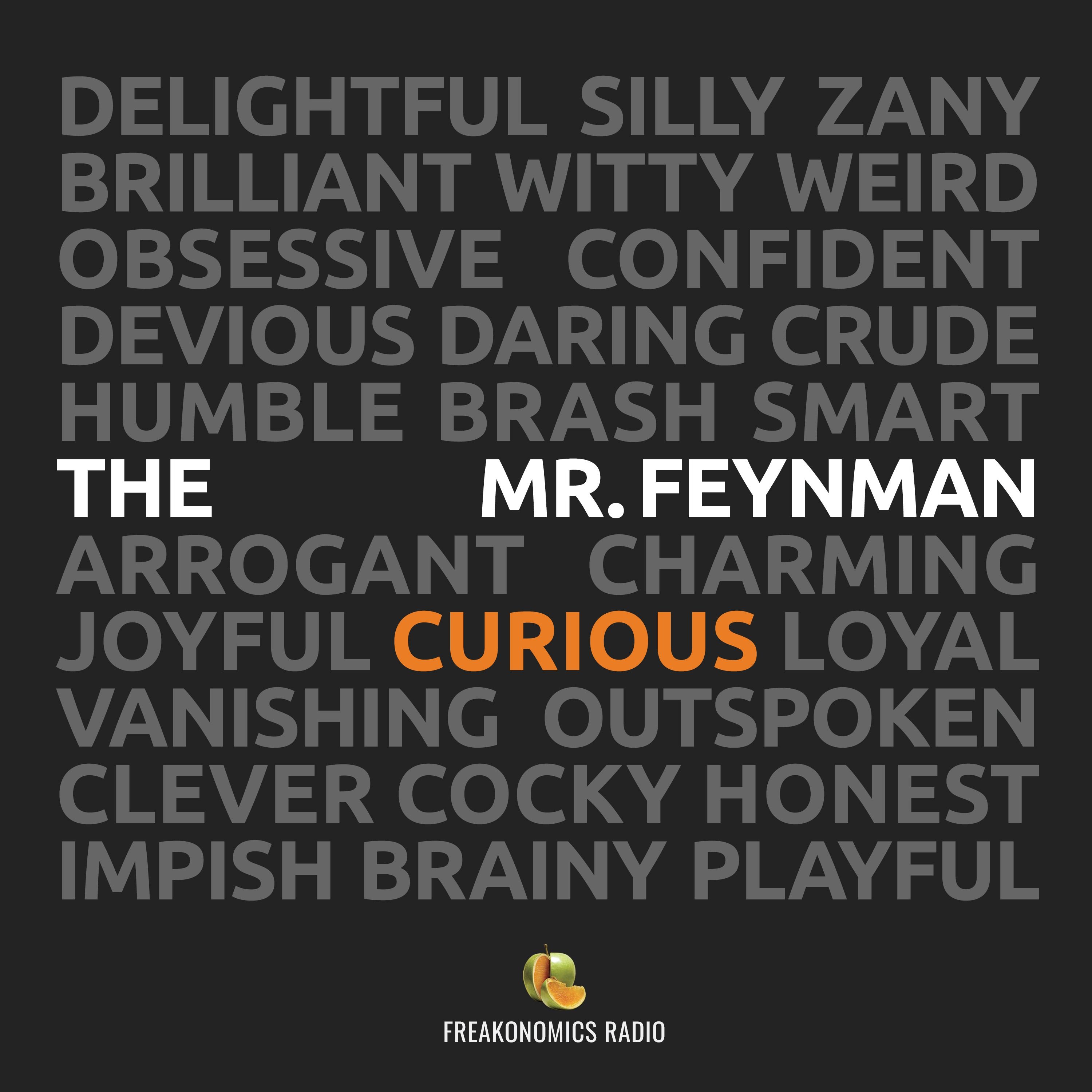Folgen
-
Justin Trudeau, facing record-low approval numbers, is doubling down on his progressive agenda. But he is so upbeat (and Canada-polite) that it’s easy to miss just how radical his vision is. Can he make it work?
SOURCE:Justin Trudeau, Prime Minister of Canada.RESOURCES:2024 Canadian Federal Budget."Canada to Set First-Ever Cap on Temporary Residents," by Nadine Yousif (BBC News, 2023).Common Ground, by Justin Trudeau (2014).EXTRAS:"Why Is Everyone Moving to Canada?" by Freakonomics Radio (2024). -
So you want to help people? That’s great — but beware the law of unintended consequences. Three stories from the modern workplace.
SOURCES:Joshua Angrist, professor of economics at the Massachusetts Institute of Technology.Zoe Cullen, professor of business administration at Harvard Business School.Marina Gertsberg, senior lecturer in finance at the University of Melbourne.RESOURCES:"Is Pay Transparency Good?" by Zoë Cullen (Journal of Economic Perspectives, 2024)."DP18969 Economics Coauthorships in the Aftermath of MeToo," by Noriko Amano-Patino, Elisa Faraglia, and Chryssi Giannitsarou (CEPR Discussion Paper, 2024)."The Underground Economy of Company Reviews," by Shikhar Sachdev (Career Fair, 2023)."Why Did Gender Wage Convergence in the United States Stall?" by Peter Q. Blair and Benjamin Posmanick (NBER Working Paper, 2023)."The Unintended Consequences of #MeToo: Evidence from Research Collaborations," by Marina Gertsberg (SSRN, 2022)."Outsourcing Tasks Online: Matching Supply and Demand on Peer-to-Peer Internet Platforms," by Zoë Cullen and Chiara Farronato (Management Science, 2021)."Equilibrium Effects of Pay Transparency," by Zoe B. Cullen and Bobak Pakzad-Hurson (NBER Working Paper, 2021)."How Much Does Your Boss Make? The Effects of Salary Comparisons," by Zoë Cullen and Ricardo Perez-Truglia (NBER Working Paper, 2018)."Wall Street Rule for the #MeToo Era: Avoid Women at All Cost," by Gillian Tan and Katia Porzecanski (Bloomberg, 2018)."A Comprehensive Analysis of the Effects of US Disability Discrimination Laws on the Employment of the Disabled Population," by Patrick Button, Philip Armour, and Simon Hollands (NBER Working Paper, 2016)."Consequences of Employment Protection? The Case of the Americans with Disabilities Act," by Daron Acemoglu and Joshua Angrist (Journal of Political Economy, 2001). -
Fehlende Folgen?
-
The psychologist Daniel Kahneman — a Nobel laureate and the author of Thinking, Fast and Slow — recently died at age 90. Along with his collaborator Amos Tversky, he changed how we all think about decision-making. The journalist Michael Lewis told the Kahneman-Tversky story in a 2016 book called The Undoing Project. In this episode, Lewis explains why they had such a profound influence.
SOURCE:Michael Lewis, writer.RESOURCES:The Undoing Project, by Michael Lewis (2016).Thinking, Fast and Slow, by Daniel Kahneman (2011).The Big Short: Inside the Doomsday Machine, by Michael Lewis (2010).Nudge: Improving Decisions About Health, Wealth, and Happiness, by Richard Thaler and Cass Sunstein (2009).Moneyball: The Art of Winning an Unfair Game, by Michael Lewis (2004).“Who’s On First,” by Richard Thaler and Cass Sunstein (New Republic, 2003).“The Framing of Decisions and the Psychology of Choice,” by Daniel Kahneman and Amos Tversky (Science, 1981).“Prospect Theory: An Analysis of Decision Under Risk,” by Daniel Kahneman and Amos Tversky (Econometrica, 1979).“Judgment under Uncertainty: Heuristics and Biases,” by Daniel Kahneman and Amos Tversky (Science, 1974).“Subjective Probability: A Judgment of Representativeness,” by Daniel Kahneman and Amos Tversky (Cognitive Psychology, 1972).EXTRAS:"Remembering Daniel Kahneman," by People I (Mostly) Admire (2024)."Why Are People So Mad at Michael Lewis?" by Freakonomics Radio (2023)."Did Michael Lewis Just Get Lucky with 'Moneyball'?" by Freakonomics Radio (2022). -
People who are good at their jobs routinely get promoted into bigger jobs they’re bad at. We explain why firms keep producing incompetent managers — and why that’s unlikely to change.
SOURCES:Nick Bloom, professor of economics at Stanford University.Katie Johnson, freelance data and analytics coach.Kelly Shue, professor of finance at the Yale University School of Management.Steve Tadelis, professor of economics at the University of California, Berkeley Haas School of Business.RESOURCES:“People Management Skills, Employee Attrition, and Manager Rewards: An Empirical Analysis,” by Mitchell Hoffman and Steven Tadelis (Journal of Political Economy, 2021).“Promotions and the Peter Principle,” by Alan Benson, Danielle Li, and Kelly Shue (The Quarterly Journal of Economics, 2019).“Bosses Matter: The Effects of Managers on Workers’ Performance,” by Kathryn L. Shaw (IZA World of Labor, 2019).“The Value of Bosses,” by Edward P. Lazear, Kathryn L. Shaw, and Christopher T. Stanton (Journal of Labor Economics, 2015).The Peter Principle: Why Things Always Go Wrong, by Laurence J. Peter and Raymond Hull (1969).EXTRAS:“The Secret Life of C.E.O.s” series by Freakonomics Radio.“What Does a C.E.O. Actually Do?” by Freakonomics Radio (2018). -
Fareed Zakaria says yes. But it’s not just political revolution — it’s economic, technological, even emotional. He doesn’t offer easy solutions but he does offer some hope.
SOURCES:Fareed Zakaria, journalist and author.RESOURCES:Age of Revolutions: Progress and Backlash from 1600 to the Present, by Fareed Zakaria (2024)."The Ultimate Election Year: All the Elections Around the World in 2024," by Koh Ewe (TIME, 2023)."The Tea Party and the Remaking of Republican Conservatism," by Vanessa Williamson, Theda Skocpol, and John Coggin (Perspectives on Politics, 2011).The Post-American World, by Fareed Zakaria (2008).The Future of Freedom: Illiberal Democracy at Home and Abroad, by Fareed Zakaria (2003).EXTRAS:"Is the U.S. Really Less Corrupt Than China?" by Freakonomics Radio (2021). -
The political debates over immigration can generate a lot of fuzzy facts. We wanted to test Americans’ knowledge — so, to wrap up our special series on immigration, we called some Freakonomics Radio listeners and quizzed them.
SOURCES:Zeke Hernandez, professor at the Wharton School at the University of Pennsylvania.RESOURCES:The Truth About Immigration: Why Successful Societies Welcome Newcomers, by Zeke Hernandez (2024, available for pre-order).EXTRA:“The True Story of America’s Supremely Messed-Up Immigration System,” series by Freakonomics Radio (2024). -
As the U.S. tries to fix its messy immigration system, our neighbor to the north is scooping up more talented newcomers every year. Are the Canadians stealing America’s bacon? (Part three of a three-part series.)
SOURCES:Zeke Hernandez, professor at the Wharton School at the University of Pennsylvania.William Kerr, professor of business administration at Harvard Business School.David Leonhardt, senior writer at the New York Times.Sindhu Mahadevan, creator of This Immigrant Life newsletter.Marc Miller, Member of Parliament and Minister of Immigration, Refugees, and Citizenship of Canada.Mike Savage, Mayor of Halifax, Nova Scotia.RESOURCES:The Truth About Immigration: Why Successful Societies Welcome Newcomers, by Zeke Hernandez (2024, available for pre-order)."The Border Where Different Rules Apply," by Seth Freed Wessler (The New York Times Magazine, 2023)."Last Year, Canada Became My Home. Feeling Like a Canadian Will Take a Bit Longer," by Sindhu Mahadevan (CBC News, 2023)."Canadians Are Starting to Sour on Migration," (The Economist, 2023).The Gift of Global Talent: How Migration Shapes Business, Economy & Society, by William Kerr (2018).EXTRAS:“The True Story of America’s Supremely Messed-Up Immigration System,” series by Freakonomics Radio (2024)."Is the American Dream Really Dead?" by Freakonomics Radio (2017). -
The U.S. immigration system is a massively complicated machine, with a lot of worn-out parts. How to fix it? Step one: Get hold of some actual facts and evidence. (We did this step for you.) (Part two of a three-part series.)
SOURCES:Zeke Hernandez, professor at the Wharton School at the University of Pennsylvania.David Leonhardt, senior writer at the New York Times.Sindhu Mahadevan, creator of This Immigrant Life newsletter.RESOURCES:The Truth About Immigration: Why Successful Societies Welcome Newcomers, by Zeke Hernandez (2024, available for pre-order)."Illegal Immigration Is a Bigger Problem Than Ever. These Five Charts Explain Why," by Andrew Mollica, Alicia A. Caldwell, Michelle Hackman, and Santiago Pérez (The Wall Street Journal, 2023).Ours Was the Shining Future: The Story of the American Dream, by David Leonhardt (2023).The Economic and Fiscal Consequences of Immigration, by the National Academies of Sciences, Engineering, and Medicine (2017).EXTRAS:“The True Story of America’s Supremely Messed-Up Immigration System,” series by Freakonomics Radio (2024)."And the New Six-Word Motto for the U.S. Is …," by Stephen Dubner (Freakonomics blog, 2008). -
She arrived in the U.S. as an 11-year-old refugee, then rose to become Secretary of State. Her views on immigration, nationalism, and borders, from this 2015 interview, are almost strangely appropriate to the present moment.
SOURCE:Madeleine Albright, U.S. Secretary of State under President Bill Clinton and former U.S. Ambassador to the United Nations.RESOURCES:"Madeleine Albright, First Woman to Serve as Secretary of State, Dies at 84," by Robert D. McFadden (The New York Times, 2022)."The Case for Getting Rid of Borders — Completely," by Alex Tabarrok (The Atlantic, 2015).EXTRAS:"The True Story of America's Supremely Messed-Up Immigration System," series by Freakonomics Radio (2024)."Is Migration a Basic Human Right?" by Freakonomics Radio (2015). -
How did a nation of immigrants come to hate immigration? We start at the beginning, sort through the evidence, and explain why your grandfather was lying about Ellis Island. (Part one of a three-part series.)
SOURCES:Leah Boustan, professor of economics at Princeton University.Zeke Hernandez, professor at the Wharton School at the University of Pennsylvania.Roger Nam, professor of Hebrew Bible at Emory University.RESOURCES:The Truth About Immigration: Why Successful Societies Welcome Newcomers, by Zeke Hernandez (2024, available for pre-order)."The Refugee Advantage: English-Language Attainment in the Early Twentieth Century," by Ran Abramitzky, Leah Platt Boustan, Peter Catron, Dylan Connor, and Rob Voigt (NBER Working Paper, 2023).Streets of Gold: America's Untold Story of Immigrant Success, by Leah Boustan and Ran Abramitzky (2022)."If Liberals Won't Enforce Borders, Fascists Will," by David Frum (The Atlantic, 2019).EXTRAS:"Is Migration a Basic Human Right?" by Freakonomics Radio (2015)."Who Are the Most Successful Immigrants in the World?" by Freakonomics Radio (2013). -
Economists have discovered an odd phenomenon: many people who use social media (even you, maybe?) wish it didn’t exist. But that doesn’t mean they can escape.
SOURCES:Leonardo Bursztyn, professor of economics at the University of Chicago.Benjamin Handel, professor of economics at the University of California, Berkeley.RESOURCES:"When Product Markets Become Collective Traps: The Case of Social Media," by Leonardo Bursztyn, Benjamin Handel, Rafael Jimenez, and Christopher Roth (NBER Working Paper, 2023)."Social Media and Xenophobia: Evidence from Russia," by Leonardo Bursztyn, Georgy Egorov, Ruben Enikolopov, and Maria Petrova (NBER Working Paper, 2019)."Status Goods: Experimental Evidence from Platinum Credit Cards," by Leonardo Bursztyn, Bruno Ferman, Stefano Fiorin, Martin Kanz, and Gautam Rao (NBER Working Paper, 2017)."'Acting Wife': Marriage Market Incentives and Labor Market Investments," by Leonardo Bursztyn, Thomas Fujiwara, and Amanda Pallais (American Economic Review, 2017)."Measuring Crack Cocaine and Its Impact," by Roland G. Fryer Jr., Paul S. Heaton, Steven D. Levitt, and Kevin M. Murphy (Economic Inquiry, 2013).EXTRAS:"Is Facebook Bad for Your Mental Health?" by Freakonomics, M.D. (2022)."Why Is U.S. Media So Negative?" by Freakonomics Radio (2021). -
In ancient Rome, it was bread and circuses. Today, it’s a World Cup, an Olympics, and a new Saudi-backed golf league that’s challenging the PGA Tour. Can a sporting event really repair a country’s reputation — or will it trigger the dreaded Streisand Effect? Also: why the major U.S. sports leagues are warming up to the idea of foreign investment.
SOURCES:Jodi Balsam, professor of clinical law at Brooklyn Law School.Brandel Chamblee, Golf Channel analyst.Karen Crouse, sports journalist.Bomani Jones, sports journalist.Victor Matheson, professor of economics at the College of the Holy Cross.Alan Shipnuck, sports journalist.RESOURCES:"The New N.F.L. Owners?" by Lauren Hirsch, Kevin Draper, Michael J. de la Merced and Sarah Kessler (The New York Times, 2024)."PGA Tour Raises $1.5 Billion From Group of U.S. Investors," by Lauren Hirsch (The New York Times, 2024)."PGA Tour, LIV Golf Agree to Merge," by Andrew Beaton and Louise Radnofsky (The Wall Street Journal, 2023).Phil: The Rip-Roaring (and Unauthorized!) Biography of Golf's Most Colorful Superstar, by Alan Shipnuck (2022)."Dustin Johnson Paid £100m to Perform Late U-Turn and Join Saudi-Backed Rebel Series," by By James Corrigan and Tom Morgan (The Telegraph, 2022)."Russia Was the Hottest Place in Sports. Now It’s Frozen Out," by Joshua Robinson, Ben Cohen, and Louise Radnofsky (The Wall Street Journal, 2022)."Could This Be the Year ‘Sportwashing’ Backfires?" by Andrés Martinez (The Los Angeles Times, 2022)."The Truth About Phil and Saudi Arabia," by Alan Shipnuck (The Fire Pit Collective, 2022).The New Yale Book of Quotations, by Fred Shapiro (2021)."The Surprising Reason That There Are So Many Thai Restaurants in America," by Myles Karp (Vice, 2018).EXTRAS:"Greg Norman Takes On the P.G.A. Tour," by People I (Mostly) Admire (2023). -
What surprises lurk in our sewage? How did racist city planners end up saving Black lives? Why does Arizona grow hay for cows in Saudi Arabia? Three strange stories about the most fundamental substance we all take for granted.
SOURCES:Brian Beach, professor of economics at Vanderbilt University.Marc Johnson, professor of molecular microbiology and immunology at the University of Missouri School of Medicine.Amy Kirby, program lead for the National Wastewater Surveillance System at the Centers for Disease Control and Prevention.Natalie Koch, professor of geography at Syracuse University.RESOURCES:Arid Empire: The Entangled Fates of Arizona and Arabia, by Natalie Koch (2023)."How a Saudi Firm Tapped a Gusher of Water in Drought-Stricken Arizona," by Isaac Stanley-Becker, Joshua Partlow, and Yvonne Wingett Sanchez (The Washington Post, 2023)."Arizona Is in a Race to the Bottom of Its Water Wells, With Saudi Arabia’s Help," by Natalie Koch (The New York Times, 2022)."Tracing the Origin of SARS-CoV-2 Omicron-Like Spike Sequences Detected in Wastewater," by Martin Shafer, Devon Gregory, Marc Johnson, et al. (medRxiv, 2022)."Water and Waste: A History of Reluctant Policymaking in U.S. Cities," by Brian Beach (Working Paper, 2022).Water, Race, and Disease, by Werner Troesken (2004).COVID Data Tracker: Wastewater Surveillance, by the Centers for Disease Control and Prevention.EXTRAS:"What Is Sportswashing (and Does It Work)?" by Freakonomics Radio (2022)."Covid-19," series by Freakonomics Radio (2020-2021). -
It used to feel like magic. Now it can feel like a set of cheap tricks. Is the problem with Google — or with us? And is Google Search finally facing a real rival, in the form of A.I.-powered “answer engines”?
SOURCES:Marissa Mayer, co-founder of Sunshine; former C.E.O. of Yahoo! and vice president at Google.Ryan McDevitt; professor of economics at Duke University.Tim Hwang, media researcher and author; former Google employee.Elizabeth Reid, vice president of Search at Google.Aravind Srinivas, C.E.O. and co-founder of Perplexity.Jeremy Stoppelman, C.E.O. and co-founder of Yelp.RESOURCES:“A Fraudster Who Just Can’t Seem to Stop … Selling Eyeglasses,” by David Segal (The New York Times, 2022).Subprime Attention Crisis: Advertising and the Time Bomb at the Heart of the Internet, by Tim Hwang (2020).“Complaint: U.S. and Plaintiff States v. Google LLC,” by the U.S. Department of Justice (2020).“Fake Online Locksmiths May Be Out to Pick Your Pocket, Too,” by David Segal (The New York Times, 2016).“‘A’ Business by Any Other Name: Firm Name Choice as a Signal of Firm Quality,” by Ryan C. McDevitt (Journal of Political Economy, 2014).In the Plex: How Google Thinks, Works, and Shapes Our Lives, by Steven Levy (2011).“The Anatomy of a Large-Scale Hypertextual Web Search Engine,” by Sergey Brin and Lawrence Page (Computer Networks and ISDN Systems, 1998).EXTRAS:“Is Dialysis a Test Case of Medicare for All?” by Freakonomics Radio (2021).“How Big is My Penis? (And Other Things We Ask Google),” by Freakonomics Radio (2017). -
A wide-open conversation with three women who guided Richard Feynman through some big adventures at the Esalen Institute. (Part of our Feynman series.)
SOURCES: Barbara Berg, friend of Richard Feynman.Cheryl Haley, friend of Richard Feynman.Debby Harlow, friend of Richard FeynmaSam Stern, content creator at the Esalen Institute.EXTRAS: Richard Feynman Series, by Freakonomics Radio (2024)."The Future of Therapy Is Psychedelic," by People I (Mostly) Admire (2023). -
In his final years, Richard Feynman's curiosity took him to some surprising places. We hear from his companions on the trips he took — and one he wasn’t able to. (Part three of a three-part series.)
SOURCES: Alan Alda, actor and screenwriter.Barbara Berg, friend of Richard Feynman.Helen Czerski, physicist and oceanographer at University College London.Michelle Feynman, photographer and daughter of Richard Feynman.Cheryl Haley, friend of Richard Feynman.Debby Harlow, friend of Richard Feynman.Ralph Leighton, biographer and film producer.Charles Mann, science journalist and author.John Preskill, professor of theoretical physics at the California Institute of Technology.Lisa Randall, professor of theoretical particle physics and cosmology at Harvard University.Christopher Sykes, documentary filmmaker.Stephen Wolfram, founder and C.E.O. of Wolfram Research; creator of Mathematica, Wolfram|Alpha, and the Wolfram Language.RESOURCES: I Love My Wife..., directed by Ian Tierney (2020).Quantum Man: Richard Feynman's Life in Science, by Lawrence M. Krauss (2011).Perfectly Reasonable Deviations From the Beaten Track: Selected Letters of Richard P. Feynman, edited by Michelle Feynman (2005).The Pleasure of Finding Things Out, by Richard Feynman (1999).The Demon-Haunted World: Science as a Candle in the Dark, by Carl Sagan and Ann Druyan (1995).Genius: The Life and Science of Richard Feynman, by James Gleick (1992).The Quest for Tannu Tuva, by Christopher Sykes (1988)“What Do You Care What Other People Think?” by Richard Feynman and Ralph Leighton (1988).The Second Creation: Makers of the Revolution in Twentieth-century Physics, by Robert Crease and Charles Mann (1986).Surely You're Joking, Mr. Feynman!, by Richard Feynman and Ralph Leighton (1985).Fun to Imagine, BBC docuseries (1983).EXTRAS: “The Curious, Brilliant, Vanishing Mr. Feynman,” series by Freakonomics Radio (2024). -
What happens when an existentially depressed and recently widowed young physicist from Queens gets a fresh start in California? We follow Richard Feynman out west, to explore his long and extremely fruitful second act. (Part two of a three-part series.)
SOURCES:Seamus Blackley, video game designer and creator of the Xbox.Carl Feynman, computer scientist and son of Richard Feynman.Michelle Feynman, photographer and daughter of Richard Feynman.Ralph Leighton, biographer and film producer.Charles Mann, science journalist and author.John Preskill, professor of theoretical physics at the California Institute of Technology.Lisa Randall, professor of theoretical particle physics and cosmology at Harvard University.Christopher Sykes, documentary filmmaker.Stephen Wolfram, founder and C.E.O. of Wolfram Research; creator of Mathematica, Wolfram|Alpha, and the Wolfram Language.Alan Zorthian, architect.RESOURCES:"Love After Life: Nobel-Winning Physicist Richard Feynman’s Extraordinary Letter to His Departed Wife," by Maria Popova (The Marginalian, 2017).Quantum Man: Richard Feynman's Life in Science, by Lawrence M. Krauss (2011).The Pleasure of Finding Things Out, by Richard Feynman (1999).Genius: The Life and Science of Richard Feynman, by James Gleick (1992)."G. Feynman; Landscape Expert, Physicist’s Widow," (Los Angeles Times, 1990)."Nobel Physicist R. P. Feynman of Caltech Dies," by Lee Dye (Los Angeles Times, 1988).The Second Creation: Makers of the Revolution in Twentieth-century Physics, by Robert Crease and Charles Mann (1986).Surely You're Joking, Mr. Feynman!, by Richard Feynman and Ralph Leighton (1985).Fun to Imagine, BBC docuseries (1983)."Richard P. Feynman: Nobel Prize Winner," by Tim Hendrickson, Stuart Galley, and Fred Lamb (Engineering and Science, 1965).F.B.I. files on Richard Feynman.EXTRAS:"The Curious Mr. Feynman," by Freakonomics Radio (2024). -
They’re heading to the Super Bowl for the second time in five years. But back in 2018, they were coming off a long losing streak — and that’s the year we sat down with 49ers players, coaches, and executives to hear their turnaround plans. It’s probably time to consider the turnaround a success.
SOURCES:Jimmy Garoppolo, quarterback for the Las Vegas Raiders; former quarterback for the San Francisco 49ers.Al Guido, president of the San Francisco 49ers.Kyle Juszczyk, fullback for the San Francisco 49ers.Bob Lange, senior vice president of communications for the Philadelphia Eagles; former vice-president of communications for the San Francisco 49ers.John Lynch, general manager of the San Francisco 49ers.Paraag Marathe, president of 49ers Enterprises and executive vice-president of football operations for the San Francisco 49ers.Victor Matheson, economist at College of the Holy Cross.Kyle Shanahan, head coach of the San Francisco 49ers.Malcolm Smith, former linebacker for the San Francisco 49ers.Joe Staley, former offensive tackle for the San Francisco 49ers.Solomon Thomas, defensive tackle for the New York Jets; former defensive end for the San Francisco 49ers.Jed York, C.E.O. of the San Francisco 49ers.RESOURCES:"49ers Overreactions: Have Shanahan, Lynch Built Team That Can Last?" by Matt Maiocco (NBC Sports, 2023).“Jimmy Garoppolo Leads a 49ers Resurgence,” Victor Mather, The New York Times (December 29, 2017).“Why American Sports Are Organized As Cartels,” Tim Worstall, Forbes (January 14, 2013).NFL History - Super Bowl Winners (ESPN).EXTRAS:"When Is a Superstar Just Another Employee?" by Freakonomics Radio (2023)."How Does Playing Football Affect Your Health?" by Freakonomics, M.D. (2023)."Why Does the Most Monotonous Job in the World Pay $1 Million?" by Freakonomics Radio (2022)."The Hidden Side of Sports," series by Freakonomics Radio (2018-2019)."An Egghead’s Guide to the Super Bowl," by Freakonomics Radio (2017). -
From the Manhattan Project to the Challenger investigation, the physicist Richard Feynman loved to shoot down what he called “lousy ideas.” Today, the world is awash in lousy ideas — so maybe it’s time to get some more Feynman in our lives? (Part one of a three-part series.)
SOURCES:Helen Czerski, physicist and oceanographer at University College London.Michelle Feynman, photographer and daughter of Richard Feynman.Ralph Leighton, biographer and film producer.Charles Mann, science journalist and author.John Preskill, professor of theoretical physics at the California Institute of Technology.Stephen Wolfram, founder and C.E.O. of Wolfram Research; creator of Mathematica, Wolfram|Alpha, and the Wolfram Language.RESOURCES:"How Legendary Physicist Richard Feynman Helped Crack the Case on the Challenger Disaster," by Kevin Cook (Literary Hub, 2021).Challenger: The Final Flight, docuseries (2020).Perfectly Reasonable Deviations From the Beaten Track: Selected Letters of Richard P. Feynman, edited by Michelle Feynman (2005).The Pleasure of Finding Things Out, by Richard Feynman (1999).Genius: The Life and Science of Richard Feynman, by James Gleick (1992).“What Do You Care What Other People Think?” by Richard Feynman and Ralph Leighton (1988)."Mr. Feynman Goes to Washington," by Richard Feynman and Ralph Leighton (Engineering & Science, 1987).The Second Creation: Makers of the Revolution in Twentieth-century Physics, by Robert Crease and Charles Mann (1986).Surely You're Joking, Mr. Feynman!, by Richard Feynman and Ralph Leighton (1985)."The Pleasure of Finding Things Out," (Horizon S18.E9, 1981)."Los Alamos From Below," by Richard Feynman (UC Santa Barbara lecture, 1975)."The World from Another Point of View," (PBS Nova, 1973).EXTRAS:"Exploring Physics, from Eggshells to Oceans," by People I (Mostly) Admire (2023). -
Michael Roth of Wesleyan University doesn’t hang out with other university presidents. He also thinks some of them have failed a basic test of good sense and decency. It’s time for a conversation about college, and courage.
SOURCE:Michael S. Roth, president of Wesleyan University.RESOURCES:"Opinion: College Presidents Are Supposed to Be Moral Leaders, Not Evasive Bureaucrats," by Michael S. Roth (Los Angeles Times, 2023)."Transcript: What Harvard, MIT and Penn Presidents Said at Antisemitism Hearing," by CQ Roll Call Staff (Roll Call, 2023)."To Testify or Not to Testify in Congress? Your Job Could Hang in the Balance," by Annie Karni (The New York Times, 2023)."You Could Not Pay Me Enough to Be a College President," by Daniel W. Drezner (The Chronicle of Higher Education, 2023)."The Case for College: Promising Solutions to Reverse College Enrollment Declines," by Katharine Meyer (Brookings, 2023)."Arab Funding of American Universities: Donors, Recipients, and Impact," by Mitchell G. Bard (American-Israeli Cooperative Enterprise, 2023)."Racist Attack Spotlights Stefanik’s Echo of Replacement Theory," by Annie Karni (The New York Times, 2022)."Why Is There So Much Saudi Money in American Universities?" by Michael Sokolove (The New York Times Magazine, 2019).Safe Enough Spaces: A Pragmatist’s Approach to Inclusion, Free Speech, and Political Correctness on College Campuses, by Michael S. Roth (2019)."The Opening of the Liberal Mind," by Michael S. Roth (The Wall Street Journal, 2017).EXTRAS:"Academic Fraud," series by Freakonomics Radio (2024)."Freakonomics Radio Goes Back to School," series by Freakonomics Radio (2022). - Mehr anzeigen











